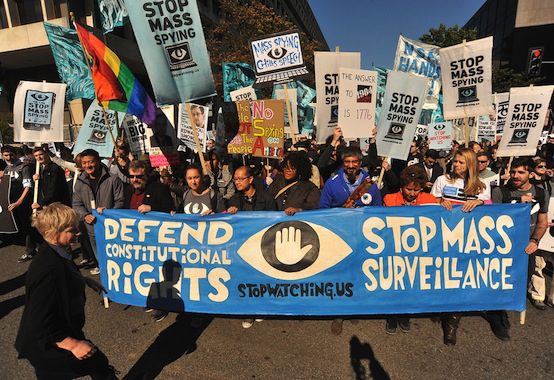“Strange Bedfellows” Are Rolling Back NSA Surveillance

Commentators short on descriptive idioms often deploy the phrase “strange bedfellows” whenever cross-ideological coalitions arise out of mutual concern for civil liberties. Saturday’s “Stop Watching Us” rally in Washington, D.C., endorsed as it was by organizations both left and right, represented the latest such occasion.
Fresh off a leading role in forcing the partial government shutdown, “Tea Party” group FreedomWorks shared billing with (among many others) the ACLU, the Council on American Islamic Relations, and the “Anonymous” hacktivist collective. One MSNBC reporter deemed rally-goers a “strange political hodgepodge,” portraying their heterogeneity as a bizarre phenomenon that never would have materialized but for the uniquely broad-based outrage spurred by Edward Snowden’s disclosures of the National Security Agency’s mass unchecked surveillance on American citizens.
The rally’s marquee speaker was Rep. Justin Amash (R-Mich.), and though a tad tentative in presentation, he detailed with vigor the quickening movement in Congress to restore Americans’ civil liberties. This summer, an amendment Amash co-authored with Rep. John Conyers (D-Mich.) to defund the massive NSA phone record collection program nearly passed the House, much to the shock of the intelligence community and conventional wisdom. “When the vote came down, it was close. It scared people,” he said. “It scared the establishment in both parties.” The crowd exulted. Amash later told me he regarded anti-surveillance activism as an “important” step toward lasting transpartisan cooperation, and reported that the USA FREEDOM Act—legislation to curtail the NSA’s powers—would pass today if brought to the House floor. These developments were buoyed by grassroots activism, Amash emphasized.
Perhaps the burgeoning coalition of technologists, traditional conservatives, stalwart liberals, and myriad others receives scorn precisely because it is starting to get results.
In the run-up to the rally, journalist Tom Watson wrote a widely-circulated essay at Salon positing that the operational involvement of the Libertarian Party and kindred organizations “infected” the event irreparably, and the left should therefore withdraw its support. Progressives and libertarians might occasionally find common cause on narrow issues, this argument went, but establishing anything like a formal alliance is indefensible given the standard libertarian positions against abortion rights, social welfare programs, and so forth.
No office-holding Democrat addressed the crowd, but Dennis Kucinich, the former representative from Ohio and eager forger of counter-intuitive alliances, preceded Amash with a rousing speech. Afterwards, I confronted him with Watson’s challenge: ought the robust presence of libertarian groups, some expressly affiliated with the GOP, taint the rally and its message in the eyes of progressives? Kucinich was unmoved. “The Constitution belongs to everyone, whatever their political party, whatever their ideology,” he said. “Everyone deserves the protection of the first and fourth amendments. I said it today—we’re not here as partisans. We’re here as Americans.”
The modern Democratic Party itself is a diffuse coalition of interest groups and factions bound together by little beyond raw political expediency. Why is it defensible for “progressives” of Watson’s ilk to work within a party structure dominated by pro-military intervention corporatists—yet working with libertarians is considered a nonstarter?
Throughout U.S. history, nascent populist-oriented coalitions have always been cobbled together messily, and the left-libertarian anti-surveillance lobby is of course no exception. “Part of what we’re trying to do is set out a new model,” said rally organizer JJ Emru when asked to react to Waston’s line of thinking. “To say, if we overcome some of our differences, we can definitely achieve this.”
If nothing else, efforts like Stop Watching Us have the effect of scrambling party allegiances and creating room for unorthodox coalition-building that can challenge the status quo. In the world of Washington commentary, bipartisan cooperation is lauded as healthy and serious, if it involves “compromises” to expand the national security state or cut spending on entitlements. An alliance featuring the likes of Amash and Kucinich is little more than a fleeting convergence of “strange bedfellows.”
With today’s formal introduction of the USA FREEDOM Act by Senate Judiciary Committee Chairman Patrick Leahy (D-Vt.) and Patriot Act author Rep. Jim Sensenbrenner (R-Wisc.), the convergence appears to be more than fleeting. Beyond just reining in the NSA, these “strange bedfellows” are redefining what it means to work across the aisle.
Comments